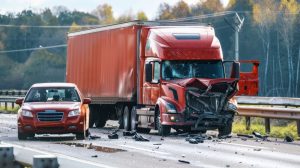Suing Out-of-State Trucking Companies After a Crash in North Carolina
 When you’ve been hit by a commercial truck, the stress and trauma are overwhelming—but when you find out that the truck was owned by an out-of-state trucking company, the situation gets even more complex. North Carolina drivers tend to worry about their legal rights, wondering if they have the right to sue an out-of-state trucking company. You can, but these cases tend to be more complicated than cases involving local companies.
When you’ve been hit by a commercial truck, the stress and trauma are overwhelming—but when you find out that the truck was owned by an out-of-state trucking company, the situation gets even more complex. North Carolina drivers tend to worry about their legal rights, wondering if they have the right to sue an out-of-state trucking company. You can, but these cases tend to be more complicated than cases involving local companies.
If you’ve been injured in a North Carolina trucking accident, you have legal options. Your first step is a free consultation to discuss your accident and injuries. Let’s talk more—call Price, Petho & Associates today.
Your rights under North Carolina law
The law you’re looking for when you want to sue an out-of-state trucking company comes from North Carolina General Statutes 1-75.4. It outlines that someone can sue a party if they are in the state, domiciled in the state, or—and this is the important part—if they are engaged in substantial activity within the state. Another important part of the law allows a claim in a North Carolina court when the at-fault party committed an act or omission in North Carolina that caused injury to person or property.
Why is this important? It makes lawsuits more accessible to injured North Carolina victims. An injured victim is much less likely to take legal action against the at-fault party if they have to travel out of state to take them to court. If you’re already facing medical bills and lost wages, the additional costs of an out-of-state lawsuit are likely to be so prohibitive that you don’t even consider it.
How jurisdiction works in North Carolina cases
Part of your trucking accident attorney’s job is to prove that the court in which they are suing has jurisdiction over the case. This is broken down a bit in the law we just discussed, but we’ll go a little further. There are two types of jurisdiction that come into play. The first is subject matter jurisdiction—the court’s authority to hear the type of case you’re filing. The second is personal jurisdiction—the court’s authority over the trucking company or driver involved. A court may claim jurisdiction when a crash occurs in their state (even if the truck company is headquartered elsewhere), the trucking company regularly sends trucks into North Carolina, or the trucking company has contacts within the state.
Why cases with interstate carriers are more complex
Collisions involving out-of-state trucks tend to be more complicated than standard car accidents. This is because commercial trucks that engage in interstate travel are governed by both state law and federal law, which brings in a whole separate set of laws and factors to consider.
Because interstate drivers are bound by the regulations set by the FMCSA, your truck accident lawyer will likely look into those regulations as they build your case. If they can prove that the truck driver or their company violated federal regulations during the trip in which you were injured, that will likely strengthen your case.
In addition, truck accidents in general are complex. Beyond the driver potentially being at fault, the company, freight broker, or repair provider may also have some liability. Sorting through this evidence and determining how liability is divided can be challenging in any situation, but it’s especially difficult when you’re talking about companies and service providers that are hundreds or thousands of miles away.
The importance of evidence preservation
One of the biggest challenges in truck accident cases is preserving evidence before it disappears, either due to time, loss, or intentional destruction. Trucking companies and their insurers act quickly after a crash—it’s likely that their insurance company will already know what happened before you’ve even made it home from the scene. Their goal is to minimize their liability. Critical evidence can be lost quickly if you don’t actively take steps to preserve it.
Some of the most important types of evidence in these cases include:
- Driver logs showing how long the driver was behind the wheel at the time of the collision.
- Electronic logging device data showing driving time, speed, and rest breaks, all of which can be used to confirm whether or not the driver was compliant with hours-of-service regulations.
- Event data recorder data showing what happened immediately prior to and during the collision, such as braking, swerving, or accelerating.
- Inspection and maintenance records proving whether or not the truck was safe to drive
- Company safety policies and hiring records that may show a pattern of the trucking company’s negligence.
Legally, some of these records are required to be maintained. Hours-of-service logs and electronic logging device data must be kept for six months, while inspection and repair records must be maintained for one year while the vehicle is in service. But if your case drags on too long, it’s easy for that time to slip away. Retaining a lawyer immediately gives you a chance to send a spoliation letter demanding the maintenance and safekeeping of relevant evidence and records. Your trucking accident law firm can handle communication with all relevant parties.
Start your truck accident case now with Price, Petho & Associates
The team at Price, Petho & Associates is committed to helping you demand full and fair compensation after a crash. Call us now or get in touch online to schedule a consultation immediately.

Attorney Doug Petho is the owner and founder of Price, Petho & Associates. His primary focus is the litigation of plaintiff’s personal injury suits, and he has successfully tried hundreds of cases to jury verdict involving car accidents, trucking accidents, pedestrian accidents, slip and fall accidents, and work-related accidents. Contact his office in Charlotte today.
